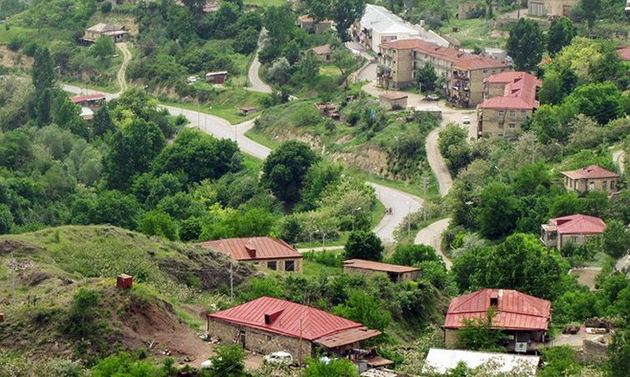Azerbaijanis’ homecoming to Nagorno-Karabakh following Azerbaijan’s recent victory in a six-week war with Armenia has a Jewish side. Azerbaijan has been home to Jews for centuries, while Israel and Azerbaijan have enjoyed flourishing ties for decades, Jewish News Syndicate writes in the article Azerbaijanis navigate their homecoming to Karabakh.
But the Jewish angle to the decades-long Nagorno-Karabakh conflict and the Azerbaijani homecoming to previously occupied territories in Karabakh (“Nagorno” simply means “mountainous”) is about more than a country known for positive Muslim-Jewish relations. It involves the predicament of homecoming and the emotions surrounding cultural patrimony—sentiments that are familiar throughout Jewish history.
More than 30 years of Armenian inhabitation and Azerbaijani absence have literally changed the landscape of Azerbaijani culture and life in Karabakh. Even as several U.N. resolutions over the years have affirmed Karabakh as part of Azerbaijan, Azerbaijanis have felt an international indifference, at best, to the dramatic loss of their heritage and homes in Karabakh. Azerbaijani Jews share their compatriots’ sense that Karabakh is an integral component of the country’s beating heart. Daniel Zarbaliv, a soldier from the all-Jewish town of Krasnaya Sloboda, exudes pride in “liberating lands that were conquered more than 30 years ago.” His sentiments echo those of Albert Agarunov, the Azerbaijani Jew who was killed in May 1992 while trying to save his fellow soldiers as they defended Karabakh. Agarunov posthumously received his government’s highest military recognition: the National Hero of Azerbaijan. Before his death in battle, he had said, “This is my land. I don’t have another motherland. It’s natural for me to defend my home.” Indeed, Azerbaijanis worldwide are rejoicing at what they see as finally returning home. Many Azerbaijanis consider Karabakh the epicenter of Azerbaijan’s rich, sophisticated heritage, which has endured for centuries. The loss of Karabakh, beginning in 1988, came as a shock to many.
To what, exactly, are Azerbaijanis returning home?
For the more than 600,000 Internally Displaced Persons (IDPs) who were forced to flee Karabakh for Azerbaijan’s capital of Baku, the homecoming signifies returning to their family and childhood roots. Karabakh may invoke a maelstrom of deeply unhappy and deeply happy memories. They are the “lucky” ones who stayed alive and found refuge in Baku. But many of their family members met horrible, sudden deaths in Karabakh.
To many other Azerbaijanis, returning home invokes visions of artists, musicians and poets in Shusha, the city known as “the conservatory of the Caucasus.” Some might remember museums in Karabakh established in honor of those beloved cultural figures. But according to the Azerbaijan National Committee of the International National Council of Museums (ICOM), “As a result of the conflict in Karabakh, a total of 900 settlements, 150,000 houses, 7,000 public buildings, 693 schools, 855 kindergartens, 695 medical institutions, 927 libraries, 44 temples, nine mosques, 473 historical monuments, 22 museums, more than 100,000 museum exhibits and other infrastructure facilities were destroyed.”
Destruction of cultural property is one devastating consequence of war, but what about the uprooting of culture? What happens to the children’s choir that honed its skills on Karabakh’s soil? Or to the artisans and production facilities that created the Karabakh carpets so prized by Oriental carpet collectors worldwide? Uprooting traditions has consequences.
UNESCO, the Metropolitan Museum, the Smithsonian Institution and others have issued impassioned appeals for artifacts in post-war Karabakh to be accorded respect. The Azerbaijan Ministry of Culture, ICOM’s Azerbaijan National Committee and others have been quick to respond how “too little, too late” these appeals come across to Azerbaijani stewards of culture. The ICOM committee has provided the Met with a comprehensive account of Azerbaijani culture in Karabakh to address.
To understand this dialogue about cultural property protection, Western onlookers must accept a fraught premise that is at the heart of the Nagorno-Karabakh conflict. The stated views of Azerbaijanis and Armenians on the history and heritage of Karabakh often differ wildly. Generally, Azerbaijanis consider Karabakh a cradle of Azerbaijani culture and civilization and an integral part of Azerbaijan. Armenians largely feel Karabakh is an Armenian republic with a rich Armenian history and culture.
One cherished cultural figure may inspire resilience in those returning to Karabakh. Azerbaijani poet Khurshidbanu Natavan (1832-97) channeled personal tragedy into lyrical poems, or ghazals, that came to be revered. She also created Shusha’s first literary society and implemented a water source that solved the town’s biggest engineering challenge. Today, visitors to Baku may spend time with the statue of Natavan in front of the Hard Rock Cafe in the central outdoor mall. Tomorrow, with the reopening of Karabakh, the world may find new ways to know Natavan and other Azerbaijani heroes of Karabakh. And no doubt Azerbaijanis will find new ways to build on the heritage they hold so dear.






